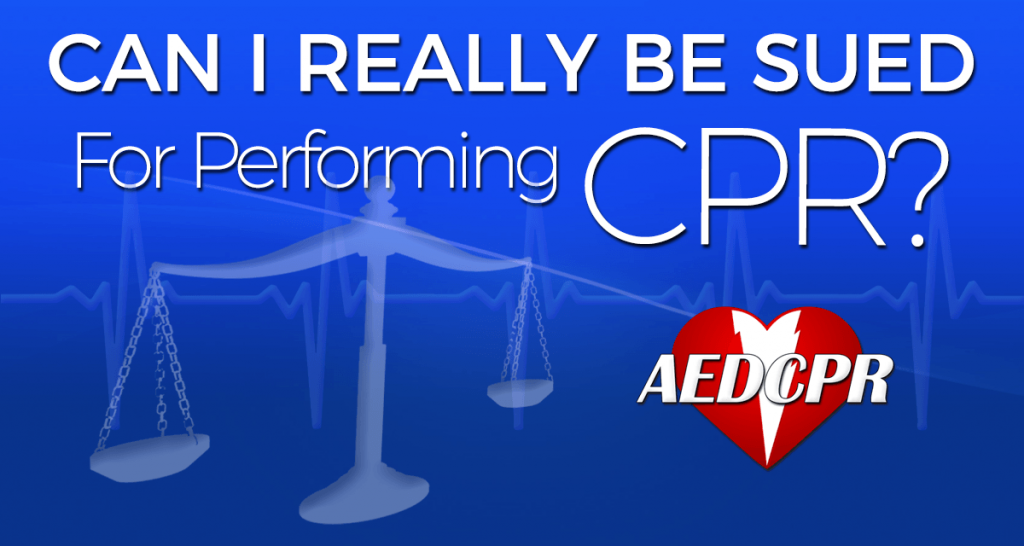
Can I Be Sued for Rendering Emergency Care?
Imagine for a minute that you see someone lying on the ground. You check to see if they’re okay and suddenly notice they’ve stopped breathing. You decide to rely on your training and perform CPR. Thanks to your efforts, the victim is successfully resuscitated and taken to the hospital. Sometime later, you find out that the chest compressions you delivered resulted in a broken rib, and now you’re being taken to court for “battery.” It’s a common enough cliche on TV, but can something like this actually happen? Can you really sue someone for performing CPR or rendering emergency care, even if it saved your life?
The answer to that question is yes- but there’s a catch. In the United States, you can sue over just about anything. The question is whether or not you can successfully sue someone over this, to which the answer is usually no. While it varies by state, there are laws in place to protect rescuers from these kinds of lawsuits.
Good Samaritan Laws
A “Good Samaritan” is legally defined as someone who voluntarily offers aid to a sick or injured person in an emergency situation. This does not include people whose job requires them to provide aid, such as EMTs, doctors, firefighters, etc. All 50 states in the U.S have what we know as Good Samaritan laws to protect them from legal action. While the details of these laws can vary between states, they cover all cover three core premises. Volunteers are not liable as long as:
- The care was provided as the result of an emergency.
- The volunteer did not cause the emergency.
- The volunteer acted in good faith, and did not deliver emergency care in a “grossly negligent or reckless manner.”
There are caveats. Some states apply a concept of “imminent peril” which means that a volunteer may not be protected unless the victim they are helping is in immediate danger. The victim must also not reject giving aid. If they are unresponsive and cannot give consent to treatment, implied consent exists.
Gross Negligence
When you step in to help someone in an emergency situation, you owe it to them to be reasonably careful. In the legal world, “negligence” describes a failure to use reasonable care. An example of negligence is a volunteer making a bad call and attempting to move a victim who should not be moved. In cases of negligence, the defendant usually doesn’t mean to harm the other party, and simply makes a mistake.
“Gross negligence” takes this concept a step further. It implies a flagrant and demonstrable disregard for safety. Rescuers guilty of gross negligence are not protected by Good Samaritan laws. As a result, they liable for any damage they cause. The line between negligence and gross negligence can be blurry at times. Taking charge of an emergency situation requires you to behave responsibly and exercise common sense.
Do Good Samaritan Laws Apply to Healthcare Providers?
Good Samaritan laws aim to protect laypersons who don’t usually administer emergency assistance. But what if that were part of their day job? Does the same apply to doctors, nurses and other trained individuals who deal with emergencies on a regular basis?
The answer: it varies between states. In some states Good Samaritan laws apply to healthcare professionals, but only in incidents outside the scope of their employment. In other words, “off the clock.” To give a crude example, a nurse on vacation can be a Good Samaritan, while an nurse on-duty may not.
State Differences
As mentioned before, even though each state’s Good Samaritan laws are largely the same, they do vary depending on where you go. Most notably, Minnesota, Vermont and Rhode Island’s laws require that any person at the scene of an emergency provide “reasonable assistance” which typically means at least calling 911. Be sure to read up on your state’s own laws.
When to Stop Giving CPR
Once you take on the responsibility of a volunteer rescuer, it is your duty to see it through. You cannot simply stop providing CPR because you feel like it. Doing so is gross negligence, and therefore not protected by Good Samaritan law. The following are acceptable reasons for stopping CPR.
- The victim recovers or begins to move.
- Trained help arrives and tells you to stop so that they may take over.
- You are physically unable to continue.
- It would be dangerous to continue.
- The victim is obviously dead.
Going Beyond Your Training
This should go without saying, but you shouldn’t administer medications, perform surgeries or take any other actions you aren’t properly trained for. For example, in most states, live-in aides who assist the elderly cannot dispense medication. Similarly, emergency medical technicians can’t administer treatment that breaks the skin (so no needles). Such actions exceed their training. If you harm someone while acting outside the scope of your training, you are liable for any damage you cause. It is important to stick to what you know. Failing to do so can have serious legal repercussions, and worse, put your patient in serious danger.
How Can I Help in an Emergency?
You can start by taking classes in CPR. You don’t have to spend hours in a classroom to learn how to save a life. Online courses today can teach you what you need to know, quickly and on your own schedule. No matter what your profession or reason for learning is, knowing what to do in an emergency situation is an invaluable asset. So is the confidence and peace of mind that comes with it. Take an online CPR course today!
